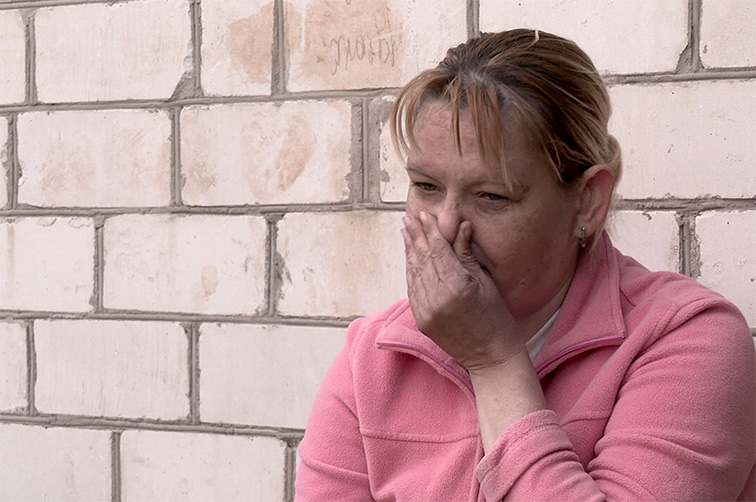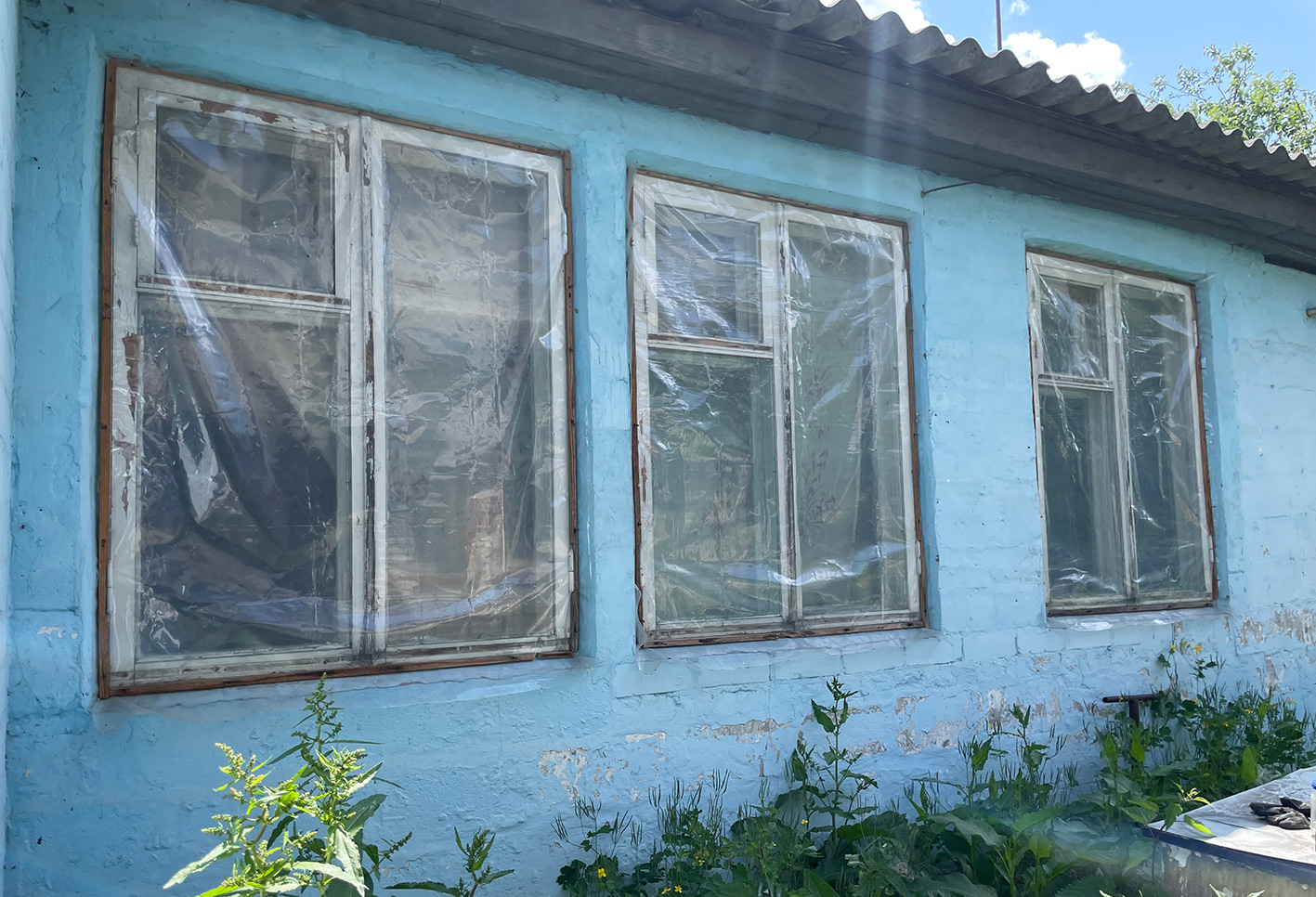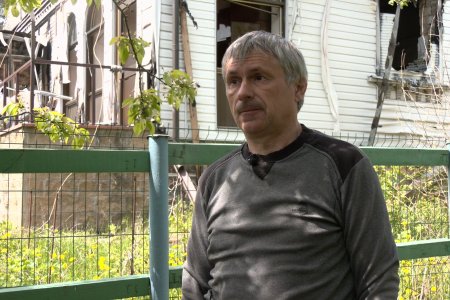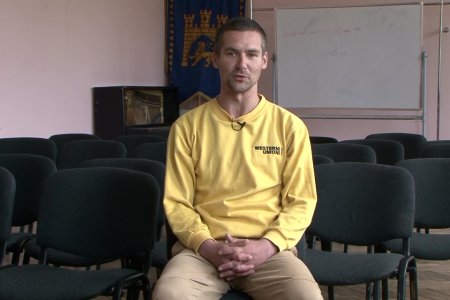I live on the other side of the village. In those houses, with my sister, daughters, and sons-in-law. There are six of us there.
Could you imagine that there would be a full-scale war?
Who knew?! Nobody thought it would happen and the tanks will come here. On 24 February, the godfather called; he was already leaving at six in the morning. He said: “There will be war! Get ready.” We began to pull boxes, clothes, and water into the cellar. We kept conserves there. We brought a bench to have a place to sit. All this had been prepared. And on 8 March, they came here in tanks (it was twenty minutes past one), and we immediately went into the cellar.
We stayed in the cellar for a month. The Russians have set up checkpoints everywhere. They came to our house with machine guns for water.
It’s good that we have a water pump because there was no electricity, tap water, or gas. I went to the pump and said to Larysa (sister): you stand on the veranda and make sure they are not there. She went to look, and I fetched a bucket and pumped water. Suddenly they appeared with a gun. Even now, as I remember it, I can’t speak.

I was so scared that I fell. And they: “Go back!” There was also a child at home. They brought machine guns into the house and ransacked everything.
— Where are you sitting?
— In the cellar.
And that’s it. But, it’s true, some of them were more or less normal; they didn’t pester or try to frighten us. They checked if there were any weapons. What kind of weapon? We are four girls in the house. Our men (sons-in-law) were taken prisoners.
Where were they kept?
There is a road service office. One was locked in one place, and the other was taken further. We asked to let the guys go. They said: “It’s your second birthday.” Still, they let them go: beaten, of course, but they let them go. They beat them and took away the phones — the sister’s husband and her daughter’s husband. They were taken from the street. And when the Russians came to us, we asked them to release our guys. My child was sitting here, they came with machine guns, and he was crying, shaking. The niece was also very frightened and said: “Can I go to the toilet?” Well, he led her straight to the bathroom. Another approached the child, pinched his nose, and said: “Don’t be afraid! I have a daughter like you. We won’t hurt you."
We went outside, and they told us to write “People — Peace” on the fence so we were not fired upon.
Once someone came, I didn’t even know who, and we didn’t let them into the house. I thought they had broken the windows. And the second time they entered the house. The tank drove here and stalled. They [demonstrates] went there, came under fire, and a tank stalled in front of our home when they returned. They spent the night, and in the morning, they came to pick up this tank. We stood, looking through the window, and he turned the gun towards the house. Then he got out, and someone shouted to him: “Valer, not there! Turn there, towards Brovary.” He fired, and our windows flew out. And I [flew] across the room into another from the shock wave. And the balcony and everything fell. So we stayed until the last, until on 1 April ours arrived. On 1 April, we were able to leave for Brovary. They settled us in a kindergarten as refugees and prepared documents. We stayed there for about a month until it was safe to return. We began to install windows all on our own.
What about your property?

The shelling dented everything, but not severely. The slate on the barn roof was damaged, and the windows flew out from the blast wave, and that’s it. Well, the house tilted a little.
Have you thought about evacuation?
It was impossible to leave, to get out of here. We didn’t think they would come here. Those who had a car could leave by car. And we don’t have it. And on 1 April, we went on foot to Brovary as the vehicles couldn’t get in and out. We got to Skybyn, and our military took us to where we asked. We arrived in Brovary. God, we were like... We’ve been in the cellar for a month: all grimy and dirty.
We arrived, and they brought us to the ATB [grossery chain]. A car was driving — a truck, brought goods, and we looked like vagabonds. We ducked down and rushed to the bench at the bus stop. People were looking at us, and we were scared as hell.
If I had stayed here for a couple more days, I would have gone crazy. They shot constantly, and it banged terribly night and day. It started at five in the morning: the tank stood here and hammered. Neighbors asked to pass at least a bucket of water, but it was scary to go outside to pump water. There were tanks around. More than 75 passed. I counted but lost the count. They were shooting, we had already left, and they were still shooting. People with cars left, and only pensioners remained here.
What are you planning to do next?
I dream about working. I need to work. My child called today and said there was a hit in Brovary near the hospital the day before yesterday. They went to give the payment for the apartment to the owner. She trades in Brovary, in a store near the hospital; she said no windows were left.
Has your attitude towards Russians changed?
We don’t need them here — the devil takes them. I don’t want to tell them anything. Let them follow the Russian ship [reference to the sunken Russian flagship Moskva]. They are all to blame — Putin and everyone else. How they torment people, even peaceful ones! Well, fight the military, but don’t touch the civilians! To hell with them! It would be better if they didn’t exist. We survived, and now God granted that peace come.



